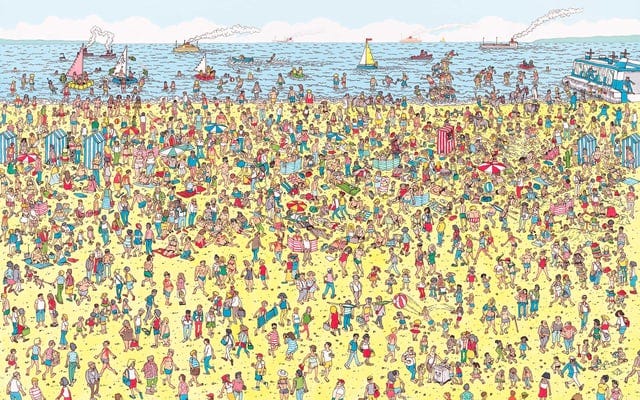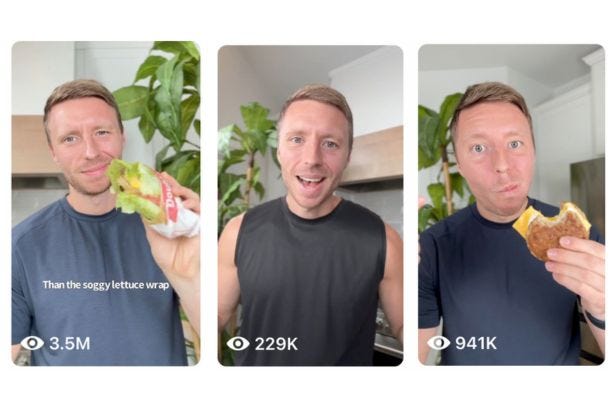Notes from the edge of civilization: July 27, 2025
No cure for food deserts; vaccines go flossy; everything is parody now.
This edition of notes from the edge of civilization is a little late today because some of the stories we were going to encapsulate for you were just too rich for summarizing. We typically collect them over the course of the week, review them, make a final shortlist and then write summations first thing Sunday morning (fueled by plenty of coffee, you know!).
Well, there was just too much good stuff, so this week be on the lookout for articles about: the billionaire escape machine; the $50 wearable wiretap that Amazon just acquired; and the ‘hot priests’ of Instagram — yes, even the marketing arm of the papacy isn’t immune from the Only Fans mentality.
So, with that, some short vignettes for your reading pleasure. And even something to watch!
Running a grocery store in New York City isn’t easy. This one, across the street from our old apartment at 53rd St. and 1st Ave. — a perfectly nice, middle-class neighborhood — was described by one Google reviewer as: “an abomination” to be avoided at all costs. And that’s a private, for-profit business with stiff competition.
So when New York mayoral candidate Zohran Mamdani floated the idea of city-run supermarkets, a lot of people recognized the idea for what it was: bonkers! As someone on the Internet recently put it: “Have you been to the DMV lately? Do you really want these same people running grocery stores?”
Solving the hunger crisis sounds good in principle, but if you want a sneak peek at how this idea plays out in reality, just look at what’s happening right now in East Kansas City. Local reporter Alyssa Jackson took a tour of the government-backed Sun Fresh Market this week, and her report showcases in two minutes how “solutions” from the political class can quickly become case studies in collapse.
The first thing that hits you, Jackson says, is the acrid smell, which causes many shoppers to walk straight back out. For the bold customer who survives the olfactory onslaught, the next thing they see is the complete lack of things to buy: barely any produce, empty coolers, next to nothing on the shelves.
"There was a time this store was on life support," said Pat Clarke, a community advocate. "I could tell you today right now it's damn near dead."
(Maybe that’s the source of the acrid smell? Just putting it out there, Pat.)
Why, oh WHY, do we keep trying to implement ideas that have been tested and proven disastrous? Political consultant Jason Curtis Anderson put it bluntly: “Government groceries have been tried before — from Birmingham to Baltimore — with predictably catastrophic results,” he stated. “These shops become political patronage rackets, then collapse, leaving cities to ship taxpayer money to landfills.”
(Um, see also government grocery stores in the USSR… Cuba…)
Real food justice doesn’t come with a heaping scoop of mold. It comes from removing the barriers to local entrepreneurship — supporting co-ops, mobile markets, and community growers. You know all those empty city lots? Release the entrepreneurs and watch what happens.
When will we abandon the idea that central planning — and handing over the produce aisle to the people who can’t even run the subway system on time — will make anything more equitable or efficient?
Remember Where’s Waldo, where you searched for a guy in a goofy hat and a red-striped shirt? In 2025, the public health version is Where’s Vaxxo and it has us searching for our next dose of life-saving medicine.
First they tried slipping it into lettuce — eat your greens and maybe get immunized. Then they flirted with genetically modified mosquitoes to “deliver vaccines” via bites — because nothing says informed consent like involuntary insect injections. Now we’re jamming flu proteins between a mouse’s teeth like some kind of dystopian Oral-B inoculant.
The question becomes: why do they keep hiding it in things we hate? Lots of people could go the rest of their life without eating another salad, no one is lining up for a slew of mosquito bites, and most people floss “regularly” the three days before a dentist’s appointment… (hey, no judgements from us!)
Here’s a theory: the messaging has collapsed, but the agenda hasn’t. People are saying no. They’re asking questions. They're opting out. A new survey out this month shows many parents are choosing to delay or refuse the government’s recommended vaccine schedule. So the strategy shifts from “you must comply” to “you won’t even notice.” It’s health by stealth. Whether you want it or not.
If we’re being totally honest — and really that’s what we need more of in this word — it boils down to this: if the product was actually saving lives in a clear, measurable, risk-free way, would they really need to sneak it into your salad? Would they really be beta-testing it on mice with keychain ring dental tools?
There’s a fine line between innovation and desperation. And right now, it looks like desperation is winning.
Did you know… there’s actually science behind all those ridiculous viral reels you see across social media?
The phrase “did you know?” creates what’s called a curiosity gap — a space between what you already know and what you might learn that your brain actively wants to close. That makes you more likely to keep watching. Additionally, social platforms reward watch time and engagement, and phrases like "did you know?" grab attention within the first 1-2 seconds and increase the chances that you’ll keep watching — also known as retention, a key metric for virality.
The repetitive format, saying the same opening again and again ("did you know…?" followed by a surprising fact) makes for a familiar rhythm that is easily processed by the brain. That means less cognitive effort, which makes people more likely to watch passively, scroll less, and even mimic the format themselves. This taps into schema theory: we like content that fits an expected template because it's easier to digest.
“Did you know?” is basically the spoken equivalent of clickbait headlines like: “You won’t believe what happened next…” that promise a payoff. We’re hardwired to pay attention to novel or potentially important information.
We couldn’t help but notice the trend and wonder about the science and the system behind it. And of course once we’ve seen the secret sauce, we decided to try our hand at using the formula — because hey, You Tube and Facebook can only keep us down so long!
Watch the video below and see if you think we succeeded:
If you get more of these in your social media “feed,” you know we’re beating the system at its own game. Of course, that’s highly unlikely even though helpful hacks to make your collapse-aware life just a little easier, and maybe just a touch more humorous, is something we could all use.
#LaughingAtTheEndOfTheWorld





